Business Law Report: Case Studies and Legal Analysis
VerifiedAdded on 2023/01/17
|9
|2581
|75
Report
AI Summary
This report provides a comprehensive analysis of business law through three case studies. The first case study examines the Equality Act 2010, Environmental Protection Act 1990, Redundancy Payments Act 1965, Data Protection Act 1998, and Copyright, Designs and Patents Act 1988, focusing on issues such as unlawful discrimination, environmental pollution, redundancy payments, data leaks, and copyright infringement. The second case study explores constructive dismissal, alternative dispute resolution methods like mediation and arbitration, the role of trade unions, the Citizens Advice Bureau, and employment tribunals. The third case study delves into the requirements of negligence in law and various funding options for negligence claims, including conditional fee agreements and 'no win no fee' arrangements. The report concludes with an overview of the key legal principles and their practical implications for businesses.

Business Law
Paraphrase This Document
Need a fresh take? Get an instant paraphrase of this document with our AI Paraphraser
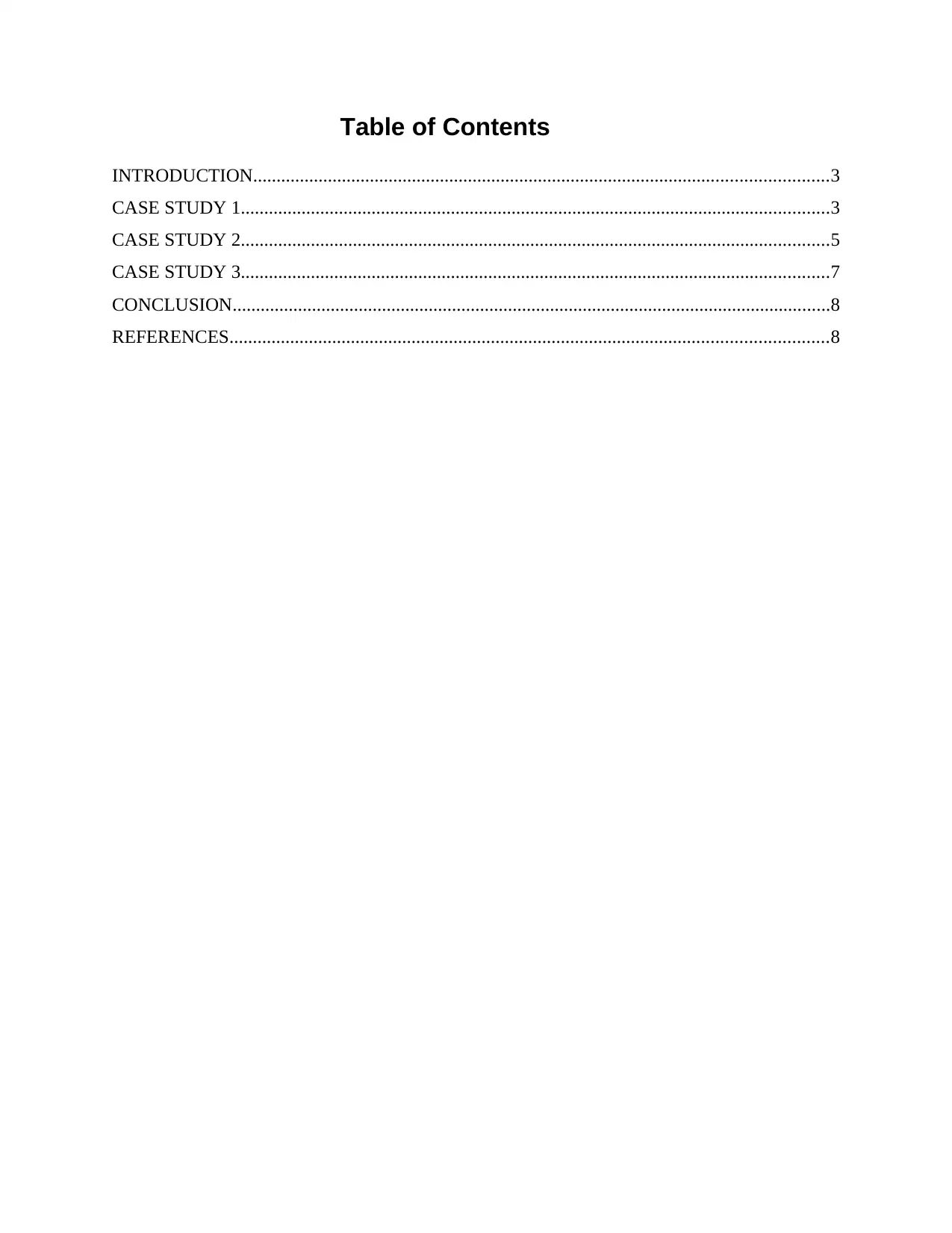
Table of Contents
INTRODUCTION...........................................................................................................................3
CASE STUDY 1..............................................................................................................................3
CASE STUDY 2..............................................................................................................................5
CASE STUDY 3..............................................................................................................................7
CONCLUSION................................................................................................................................8
REFERENCES................................................................................................................................8
INTRODUCTION...........................................................................................................................3
CASE STUDY 1..............................................................................................................................3
CASE STUDY 2..............................................................................................................................5
CASE STUDY 3..............................................................................................................................7
CONCLUSION................................................................................................................................8
REFERENCES................................................................................................................................8
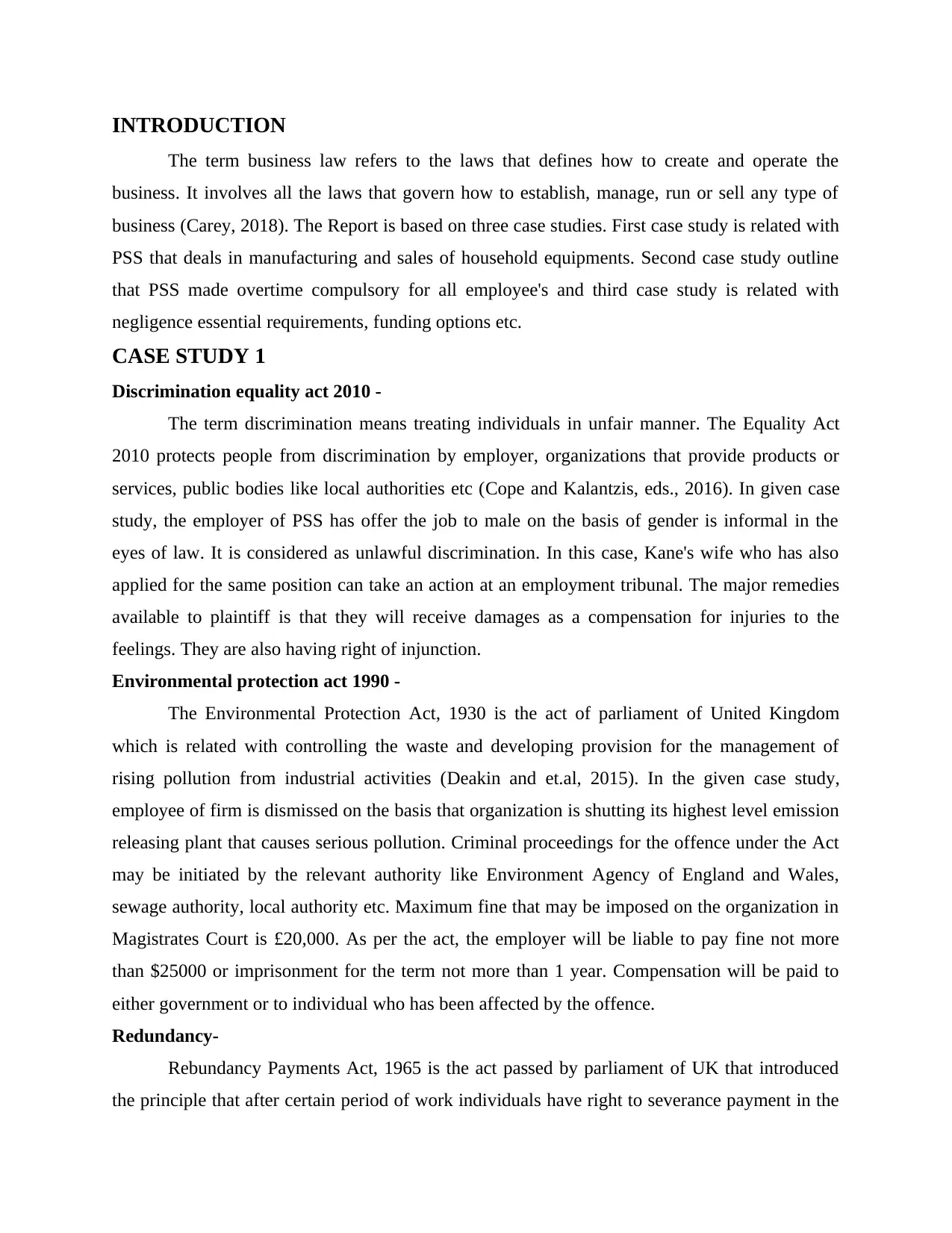
INTRODUCTION
The term business law refers to the laws that defines how to create and operate the
business. It involves all the laws that govern how to establish, manage, run or sell any type of
business (Carey, 2018). The Report is based on three case studies. First case study is related with
PSS that deals in manufacturing and sales of household equipments. Second case study outline
that PSS made overtime compulsory for all employee's and third case study is related with
negligence essential requirements, funding options etc.
CASE STUDY 1
Discrimination equality act 2010 -
The term discrimination means treating individuals in unfair manner. The Equality Act
2010 protects people from discrimination by employer, organizations that provide products or
services, public bodies like local authorities etc (Cope and Kalantzis, eds., 2016). In given case
study, the employer of PSS has offer the job to male on the basis of gender is informal in the
eyes of law. It is considered as unlawful discrimination. In this case, Kane's wife who has also
applied for the same position can take an action at an employment tribunal. The major remedies
available to plaintiff is that they will receive damages as a compensation for injuries to the
feelings. They are also having right of injunction.
Environmental protection act 1990 -
The Environmental Protection Act, 1930 is the act of parliament of United Kingdom
which is related with controlling the waste and developing provision for the management of
rising pollution from industrial activities (Deakin and et.al, 2015). In the given case study,
employee of firm is dismissed on the basis that organization is shutting its highest level emission
releasing plant that causes serious pollution. Criminal proceedings for the offence under the Act
may be initiated by the relevant authority like Environment Agency of England and Wales,
sewage authority, local authority etc. Maximum fine that may be imposed on the organization in
Magistrates Court is £20,000. As per the act, the employer will be liable to pay fine not more
than $25000 or imprisonment for the term not more than 1 year. Compensation will be paid to
either government or to individual who has been affected by the offence.
Redundancy-
Rebundancy Payments Act, 1965 is the act passed by parliament of UK that introduced
the principle that after certain period of work individuals have right to severance payment in the
The term business law refers to the laws that defines how to create and operate the
business. It involves all the laws that govern how to establish, manage, run or sell any type of
business (Carey, 2018). The Report is based on three case studies. First case study is related with
PSS that deals in manufacturing and sales of household equipments. Second case study outline
that PSS made overtime compulsory for all employee's and third case study is related with
negligence essential requirements, funding options etc.
CASE STUDY 1
Discrimination equality act 2010 -
The term discrimination means treating individuals in unfair manner. The Equality Act
2010 protects people from discrimination by employer, organizations that provide products or
services, public bodies like local authorities etc (Cope and Kalantzis, eds., 2016). In given case
study, the employer of PSS has offer the job to male on the basis of gender is informal in the
eyes of law. It is considered as unlawful discrimination. In this case, Kane's wife who has also
applied for the same position can take an action at an employment tribunal. The major remedies
available to plaintiff is that they will receive damages as a compensation for injuries to the
feelings. They are also having right of injunction.
Environmental protection act 1990 -
The Environmental Protection Act, 1930 is the act of parliament of United Kingdom
which is related with controlling the waste and developing provision for the management of
rising pollution from industrial activities (Deakin and et.al, 2015). In the given case study,
employee of firm is dismissed on the basis that organization is shutting its highest level emission
releasing plant that causes serious pollution. Criminal proceedings for the offence under the Act
may be initiated by the relevant authority like Environment Agency of England and Wales,
sewage authority, local authority etc. Maximum fine that may be imposed on the organization in
Magistrates Court is £20,000. As per the act, the employer will be liable to pay fine not more
than $25000 or imprisonment for the term not more than 1 year. Compensation will be paid to
either government or to individual who has been affected by the offence.
Redundancy-
Rebundancy Payments Act, 1965 is the act passed by parliament of UK that introduced
the principle that after certain period of work individuals have right to severance payment in the
⊘ This is a preview!⊘
Do you want full access?
Subscribe today to unlock all pages.

Trusted by 1+ million students worldwide
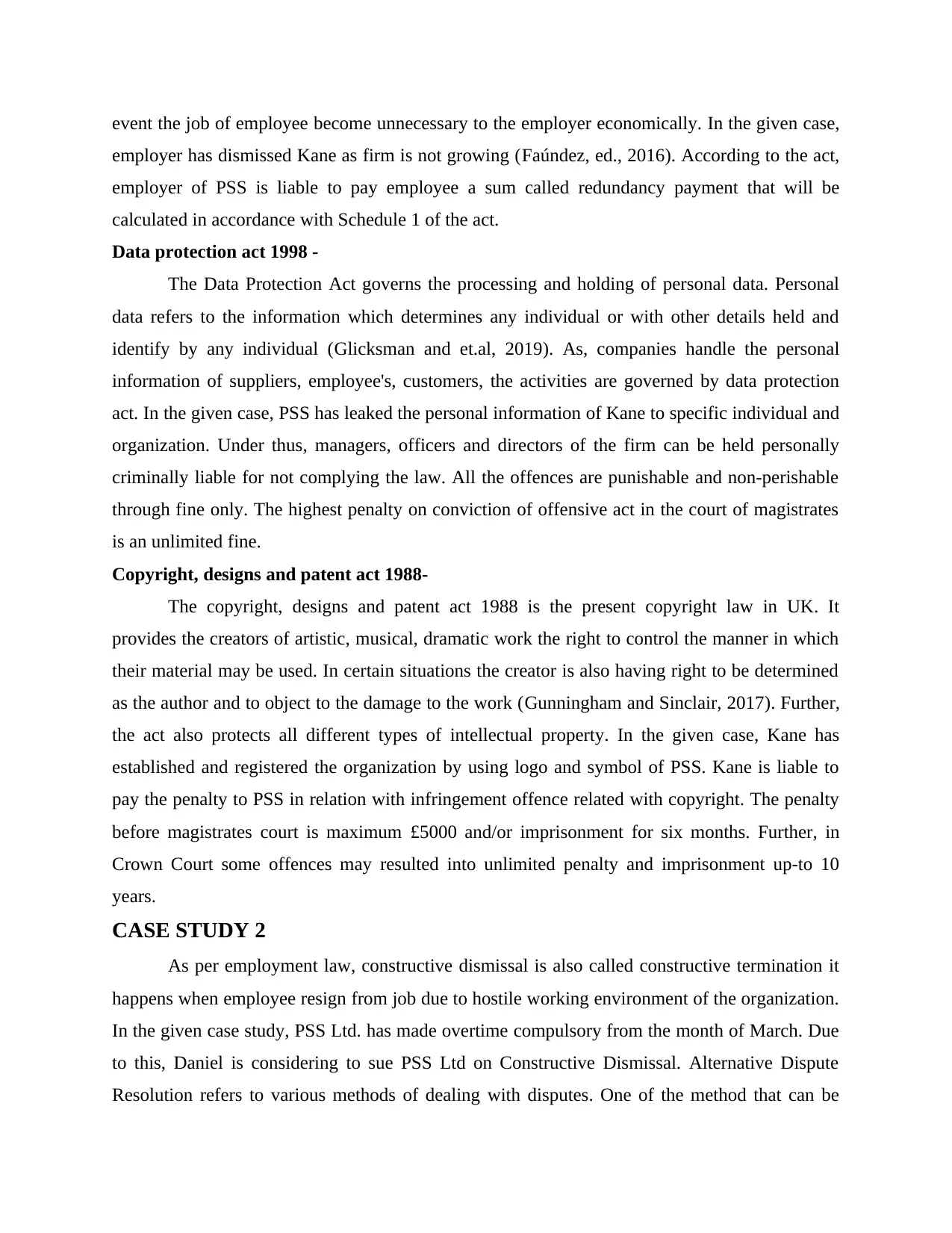
event the job of employee become unnecessary to the employer economically. In the given case,
employer has dismissed Kane as firm is not growing (Faúndez, ed., 2016). According to the act,
employer of PSS is liable to pay employee a sum called redundancy payment that will be
calculated in accordance with Schedule 1 of the act.
Data protection act 1998 -
The Data Protection Act governs the processing and holding of personal data. Personal
data refers to the information which determines any individual or with other details held and
identify by any individual (Glicksman and et.al, 2019). As, companies handle the personal
information of suppliers, employee's, customers, the activities are governed by data protection
act. In the given case, PSS has leaked the personal information of Kane to specific individual and
organization. Under thus, managers, officers and directors of the firm can be held personally
criminally liable for not complying the law. All the offences are punishable and non-perishable
through fine only. The highest penalty on conviction of offensive act in the court of magistrates
is an unlimited fine.
Copyright, designs and patent act 1988-
The copyright, designs and patent act 1988 is the present copyright law in UK. It
provides the creators of artistic, musical, dramatic work the right to control the manner in which
their material may be used. In certain situations the creator is also having right to be determined
as the author and to object to the damage to the work (Gunningham and Sinclair, 2017). Further,
the act also protects all different types of intellectual property. In the given case, Kane has
established and registered the organization by using logo and symbol of PSS. Kane is liable to
pay the penalty to PSS in relation with infringement offence related with copyright. The penalty
before magistrates court is maximum £5000 and/or imprisonment for six months. Further, in
Crown Court some offences may resulted into unlimited penalty and imprisonment up-to 10
years.
CASE STUDY 2
As per employment law, constructive dismissal is also called constructive termination it
happens when employee resign from job due to hostile working environment of the organization.
In the given case study, PSS Ltd. has made overtime compulsory from the month of March. Due
to this, Daniel is considering to sue PSS Ltd on Constructive Dismissal. Alternative Dispute
Resolution refers to various methods of dealing with disputes. One of the method that can be
employer has dismissed Kane as firm is not growing (Faúndez, ed., 2016). According to the act,
employer of PSS is liable to pay employee a sum called redundancy payment that will be
calculated in accordance with Schedule 1 of the act.
Data protection act 1998 -
The Data Protection Act governs the processing and holding of personal data. Personal
data refers to the information which determines any individual or with other details held and
identify by any individual (Glicksman and et.al, 2019). As, companies handle the personal
information of suppliers, employee's, customers, the activities are governed by data protection
act. In the given case, PSS has leaked the personal information of Kane to specific individual and
organization. Under thus, managers, officers and directors of the firm can be held personally
criminally liable for not complying the law. All the offences are punishable and non-perishable
through fine only. The highest penalty on conviction of offensive act in the court of magistrates
is an unlimited fine.
Copyright, designs and patent act 1988-
The copyright, designs and patent act 1988 is the present copyright law in UK. It
provides the creators of artistic, musical, dramatic work the right to control the manner in which
their material may be used. In certain situations the creator is also having right to be determined
as the author and to object to the damage to the work (Gunningham and Sinclair, 2017). Further,
the act also protects all different types of intellectual property. In the given case, Kane has
established and registered the organization by using logo and symbol of PSS. Kane is liable to
pay the penalty to PSS in relation with infringement offence related with copyright. The penalty
before magistrates court is maximum £5000 and/or imprisonment for six months. Further, in
Crown Court some offences may resulted into unlimited penalty and imprisonment up-to 10
years.
CASE STUDY 2
As per employment law, constructive dismissal is also called constructive termination it
happens when employee resign from job due to hostile working environment of the organization.
In the given case study, PSS Ltd. has made overtime compulsory from the month of March. Due
to this, Daniel is considering to sue PSS Ltd on Constructive Dismissal. Alternative Dispute
Resolution refers to various methods of dealing with disputes. One of the method that can be
Paraphrase This Document
Need a fresh take? Get an instant paraphrase of this document with our AI Paraphraser
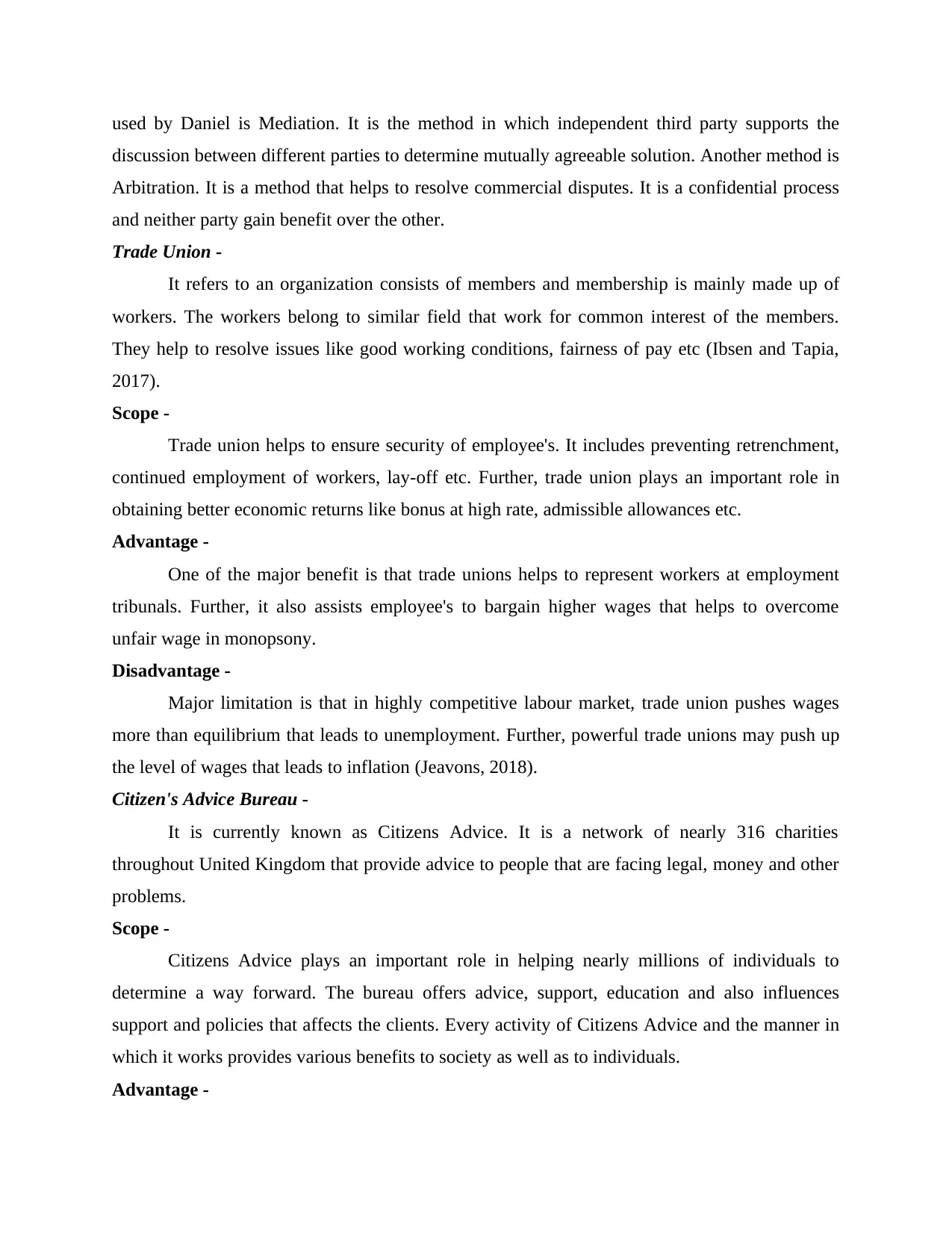
used by Daniel is Mediation. It is the method in which independent third party supports the
discussion between different parties to determine mutually agreeable solution. Another method is
Arbitration. It is a method that helps to resolve commercial disputes. It is a confidential process
and neither party gain benefit over the other.
Trade Union -
It refers to an organization consists of members and membership is mainly made up of
workers. The workers belong to similar field that work for common interest of the members.
They help to resolve issues like good working conditions, fairness of pay etc (Ibsen and Tapia,
2017).
Scope -
Trade union helps to ensure security of employee's. It includes preventing retrenchment,
continued employment of workers, lay-off etc. Further, trade union plays an important role in
obtaining better economic returns like bonus at high rate, admissible allowances etc.
Advantage -
One of the major benefit is that trade unions helps to represent workers at employment
tribunals. Further, it also assists employee's to bargain higher wages that helps to overcome
unfair wage in monopsony.
Disadvantage -
Major limitation is that in highly competitive labour market, trade union pushes wages
more than equilibrium that leads to unemployment. Further, powerful trade unions may push up
the level of wages that leads to inflation (Jeavons, 2018).
Citizen's Advice Bureau -
It is currently known as Citizens Advice. It is a network of nearly 316 charities
throughout United Kingdom that provide advice to people that are facing legal, money and other
problems.
Scope -
Citizens Advice plays an important role in helping nearly millions of individuals to
determine a way forward. The bureau offers advice, support, education and also influences
support and policies that affects the clients. Every activity of Citizens Advice and the manner in
which it works provides various benefits to society as well as to individuals.
Advantage -
discussion between different parties to determine mutually agreeable solution. Another method is
Arbitration. It is a method that helps to resolve commercial disputes. It is a confidential process
and neither party gain benefit over the other.
Trade Union -
It refers to an organization consists of members and membership is mainly made up of
workers. The workers belong to similar field that work for common interest of the members.
They help to resolve issues like good working conditions, fairness of pay etc (Ibsen and Tapia,
2017).
Scope -
Trade union helps to ensure security of employee's. It includes preventing retrenchment,
continued employment of workers, lay-off etc. Further, trade union plays an important role in
obtaining better economic returns like bonus at high rate, admissible allowances etc.
Advantage -
One of the major benefit is that trade unions helps to represent workers at employment
tribunals. Further, it also assists employee's to bargain higher wages that helps to overcome
unfair wage in monopsony.
Disadvantage -
Major limitation is that in highly competitive labour market, trade union pushes wages
more than equilibrium that leads to unemployment. Further, powerful trade unions may push up
the level of wages that leads to inflation (Jeavons, 2018).
Citizen's Advice Bureau -
It is currently known as Citizens Advice. It is a network of nearly 316 charities
throughout United Kingdom that provide advice to people that are facing legal, money and other
problems.
Scope -
Citizens Advice plays an important role in helping nearly millions of individuals to
determine a way forward. The bureau offers advice, support, education and also influences
support and policies that affects the clients. Every activity of Citizens Advice and the manner in
which it works provides various benefits to society as well as to individuals.
Advantage -
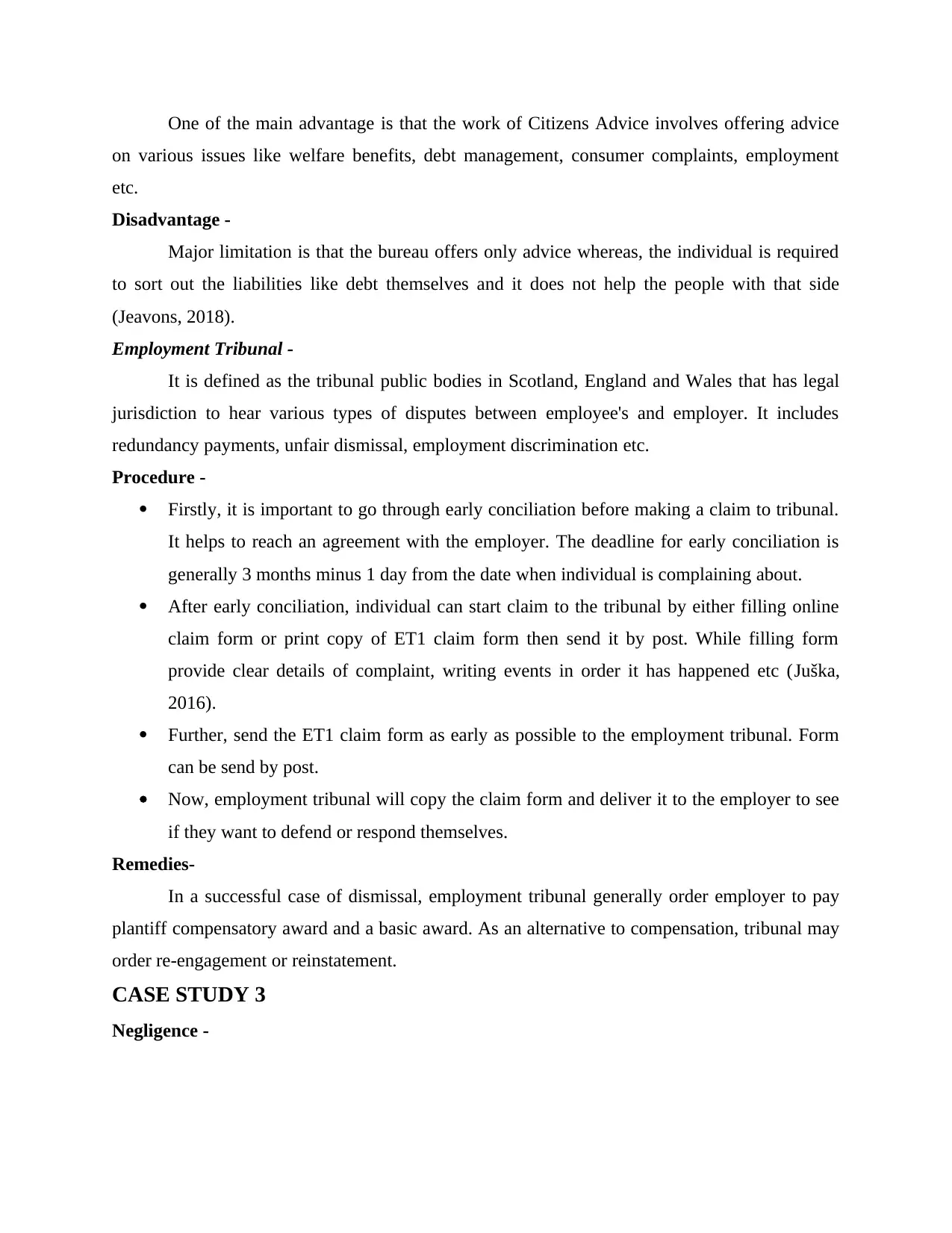
One of the main advantage is that the work of Citizens Advice involves offering advice
on various issues like welfare benefits, debt management, consumer complaints, employment
etc.
Disadvantage -
Major limitation is that the bureau offers only advice whereas, the individual is required
to sort out the liabilities like debt themselves and it does not help the people with that side
(Jeavons, 2018).
Employment Tribunal -
It is defined as the tribunal public bodies in Scotland, England and Wales that has legal
jurisdiction to hear various types of disputes between employee's and employer. It includes
redundancy payments, unfair dismissal, employment discrimination etc.
Procedure -
Firstly, it is important to go through early conciliation before making a claim to tribunal.
It helps to reach an agreement with the employer. The deadline for early conciliation is
generally 3 months minus 1 day from the date when individual is complaining about.
After early conciliation, individual can start claim to the tribunal by either filling online
claim form or print copy of ET1 claim form then send it by post. While filling form
provide clear details of complaint, writing events in order it has happened etc (Juška,
2016).
Further, send the ET1 claim form as early as possible to the employment tribunal. Form
can be send by post.
Now, employment tribunal will copy the claim form and deliver it to the employer to see
if they want to defend or respond themselves.
Remedies-
In a successful case of dismissal, employment tribunal generally order employer to pay
plantiff compensatory award and a basic award. As an alternative to compensation, tribunal may
order re-engagement or reinstatement.
CASE STUDY 3
Negligence -
on various issues like welfare benefits, debt management, consumer complaints, employment
etc.
Disadvantage -
Major limitation is that the bureau offers only advice whereas, the individual is required
to sort out the liabilities like debt themselves and it does not help the people with that side
(Jeavons, 2018).
Employment Tribunal -
It is defined as the tribunal public bodies in Scotland, England and Wales that has legal
jurisdiction to hear various types of disputes between employee's and employer. It includes
redundancy payments, unfair dismissal, employment discrimination etc.
Procedure -
Firstly, it is important to go through early conciliation before making a claim to tribunal.
It helps to reach an agreement with the employer. The deadline for early conciliation is
generally 3 months minus 1 day from the date when individual is complaining about.
After early conciliation, individual can start claim to the tribunal by either filling online
claim form or print copy of ET1 claim form then send it by post. While filling form
provide clear details of complaint, writing events in order it has happened etc (Juška,
2016).
Further, send the ET1 claim form as early as possible to the employment tribunal. Form
can be send by post.
Now, employment tribunal will copy the claim form and deliver it to the employer to see
if they want to defend or respond themselves.
Remedies-
In a successful case of dismissal, employment tribunal generally order employer to pay
plantiff compensatory award and a basic award. As an alternative to compensation, tribunal may
order re-engagement or reinstatement.
CASE STUDY 3
Negligence -
⊘ This is a preview!⊘
Do you want full access?
Subscribe today to unlock all pages.

Trusted by 1+ million students worldwide
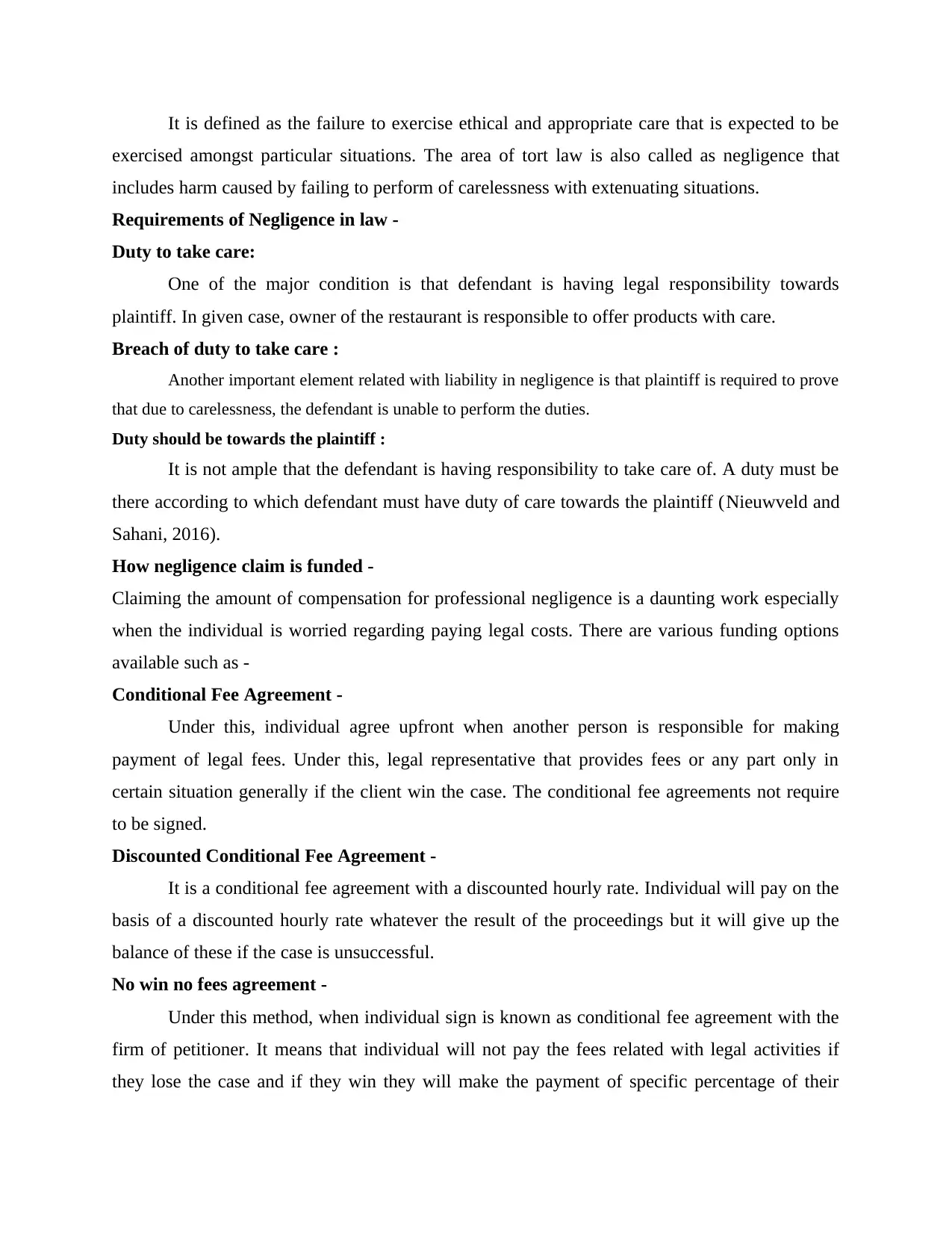
It is defined as the failure to exercise ethical and appropriate care that is expected to be
exercised amongst particular situations. The area of tort law is also called as negligence that
includes harm caused by failing to perform of carelessness with extenuating situations.
Requirements of Negligence in law -
Duty to take care:
One of the major condition is that defendant is having legal responsibility towards
plaintiff. In given case, owner of the restaurant is responsible to offer products with care.
Breach of duty to take care :
Another important element related with liability in negligence is that plaintiff is required to prove
that due to carelessness, the defendant is unable to perform the duties.
Duty should be towards the plaintiff :
It is not ample that the defendant is having responsibility to take care of. A duty must be
there according to which defendant must have duty of care towards the plaintiff (Nieuwveld and
Sahani, 2016).
How negligence claim is funded -
Claiming the amount of compensation for professional negligence is a daunting work especially
when the individual is worried regarding paying legal costs. There are various funding options
available such as -
Conditional Fee Agreement -
Under this, individual agree upfront when another person is responsible for making
payment of legal fees. Under this, legal representative that provides fees or any part only in
certain situation generally if the client win the case. The conditional fee agreements not require
to be signed.
Discounted Conditional Fee Agreement -
It is a conditional fee agreement with a discounted hourly rate. Individual will pay on the
basis of a discounted hourly rate whatever the result of the proceedings but it will give up the
balance of these if the case is unsuccessful.
No win no fees agreement -
Under this method, when individual sign is known as conditional fee agreement with the
firm of petitioner. It means that individual will not pay the fees related with legal activities if
they lose the case and if they win they will make the payment of specific percentage of their
exercised amongst particular situations. The area of tort law is also called as negligence that
includes harm caused by failing to perform of carelessness with extenuating situations.
Requirements of Negligence in law -
Duty to take care:
One of the major condition is that defendant is having legal responsibility towards
plaintiff. In given case, owner of the restaurant is responsible to offer products with care.
Breach of duty to take care :
Another important element related with liability in negligence is that plaintiff is required to prove
that due to carelessness, the defendant is unable to perform the duties.
Duty should be towards the plaintiff :
It is not ample that the defendant is having responsibility to take care of. A duty must be
there according to which defendant must have duty of care towards the plaintiff (Nieuwveld and
Sahani, 2016).
How negligence claim is funded -
Claiming the amount of compensation for professional negligence is a daunting work especially
when the individual is worried regarding paying legal costs. There are various funding options
available such as -
Conditional Fee Agreement -
Under this, individual agree upfront when another person is responsible for making
payment of legal fees. Under this, legal representative that provides fees or any part only in
certain situation generally if the client win the case. The conditional fee agreements not require
to be signed.
Discounted Conditional Fee Agreement -
It is a conditional fee agreement with a discounted hourly rate. Individual will pay on the
basis of a discounted hourly rate whatever the result of the proceedings but it will give up the
balance of these if the case is unsuccessful.
No win no fees agreement -
Under this method, when individual sign is known as conditional fee agreement with the
firm of petitioner. It means that individual will not pay the fees related with legal activities if
they lose the case and if they win they will make the payment of specific percentage of their
Paraphrase This Document
Need a fresh take? Get an instant paraphrase of this document with our AI Paraphraser
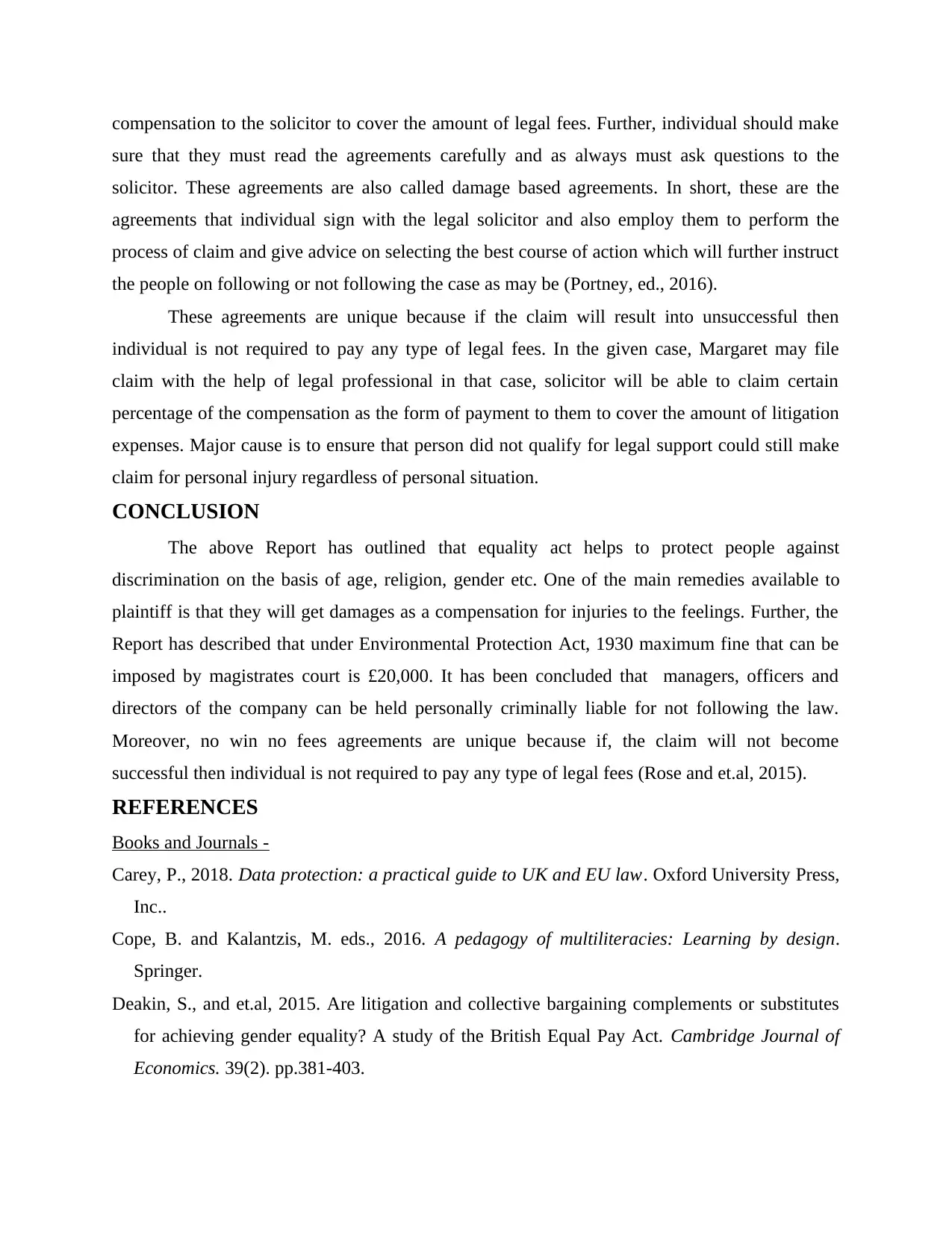
compensation to the solicitor to cover the amount of legal fees. Further, individual should make
sure that they must read the agreements carefully and as always must ask questions to the
solicitor. These agreements are also called damage based agreements. In short, these are the
agreements that individual sign with the legal solicitor and also employ them to perform the
process of claim and give advice on selecting the best course of action which will further instruct
the people on following or not following the case as may be (Portney, ed., 2016).
These agreements are unique because if the claim will result into unsuccessful then
individual is not required to pay any type of legal fees. In the given case, Margaret may file
claim with the help of legal professional in that case, solicitor will be able to claim certain
percentage of the compensation as the form of payment to them to cover the amount of litigation
expenses. Major cause is to ensure that person did not qualify for legal support could still make
claim for personal injury regardless of personal situation.
CONCLUSION
The above Report has outlined that equality act helps to protect people against
discrimination on the basis of age, religion, gender etc. One of the main remedies available to
plaintiff is that they will get damages as a compensation for injuries to the feelings. Further, the
Report has described that under Environmental Protection Act, 1930 maximum fine that can be
imposed by magistrates court is £20,000. It has been concluded that managers, officers and
directors of the company can be held personally criminally liable for not following the law.
Moreover, no win no fees agreements are unique because if, the claim will not become
successful then individual is not required to pay any type of legal fees (Rose and et.al, 2015).
REFERENCES
Books and Journals -
Carey, P., 2018. Data protection: a practical guide to UK and EU law. Oxford University Press,
Inc..
Cope, B. and Kalantzis, M. eds., 2016. A pedagogy of multiliteracies: Learning by design.
Springer.
Deakin, S., and et.al, 2015. Are litigation and collective bargaining complements or substitutes
for achieving gender equality? A study of the British Equal Pay Act. Cambridge Journal of
Economics. 39(2). pp.381-403.
sure that they must read the agreements carefully and as always must ask questions to the
solicitor. These agreements are also called damage based agreements. In short, these are the
agreements that individual sign with the legal solicitor and also employ them to perform the
process of claim and give advice on selecting the best course of action which will further instruct
the people on following or not following the case as may be (Portney, ed., 2016).
These agreements are unique because if the claim will result into unsuccessful then
individual is not required to pay any type of legal fees. In the given case, Margaret may file
claim with the help of legal professional in that case, solicitor will be able to claim certain
percentage of the compensation as the form of payment to them to cover the amount of litigation
expenses. Major cause is to ensure that person did not qualify for legal support could still make
claim for personal injury regardless of personal situation.
CONCLUSION
The above Report has outlined that equality act helps to protect people against
discrimination on the basis of age, religion, gender etc. One of the main remedies available to
plaintiff is that they will get damages as a compensation for injuries to the feelings. Further, the
Report has described that under Environmental Protection Act, 1930 maximum fine that can be
imposed by magistrates court is £20,000. It has been concluded that managers, officers and
directors of the company can be held personally criminally liable for not following the law.
Moreover, no win no fees agreements are unique because if, the claim will not become
successful then individual is not required to pay any type of legal fees (Rose and et.al, 2015).
REFERENCES
Books and Journals -
Carey, P., 2018. Data protection: a practical guide to UK and EU law. Oxford University Press,
Inc..
Cope, B. and Kalantzis, M. eds., 2016. A pedagogy of multiliteracies: Learning by design.
Springer.
Deakin, S., and et.al, 2015. Are litigation and collective bargaining complements or substitutes
for achieving gender equality? A study of the British Equal Pay Act. Cambridge Journal of
Economics. 39(2). pp.381-403.
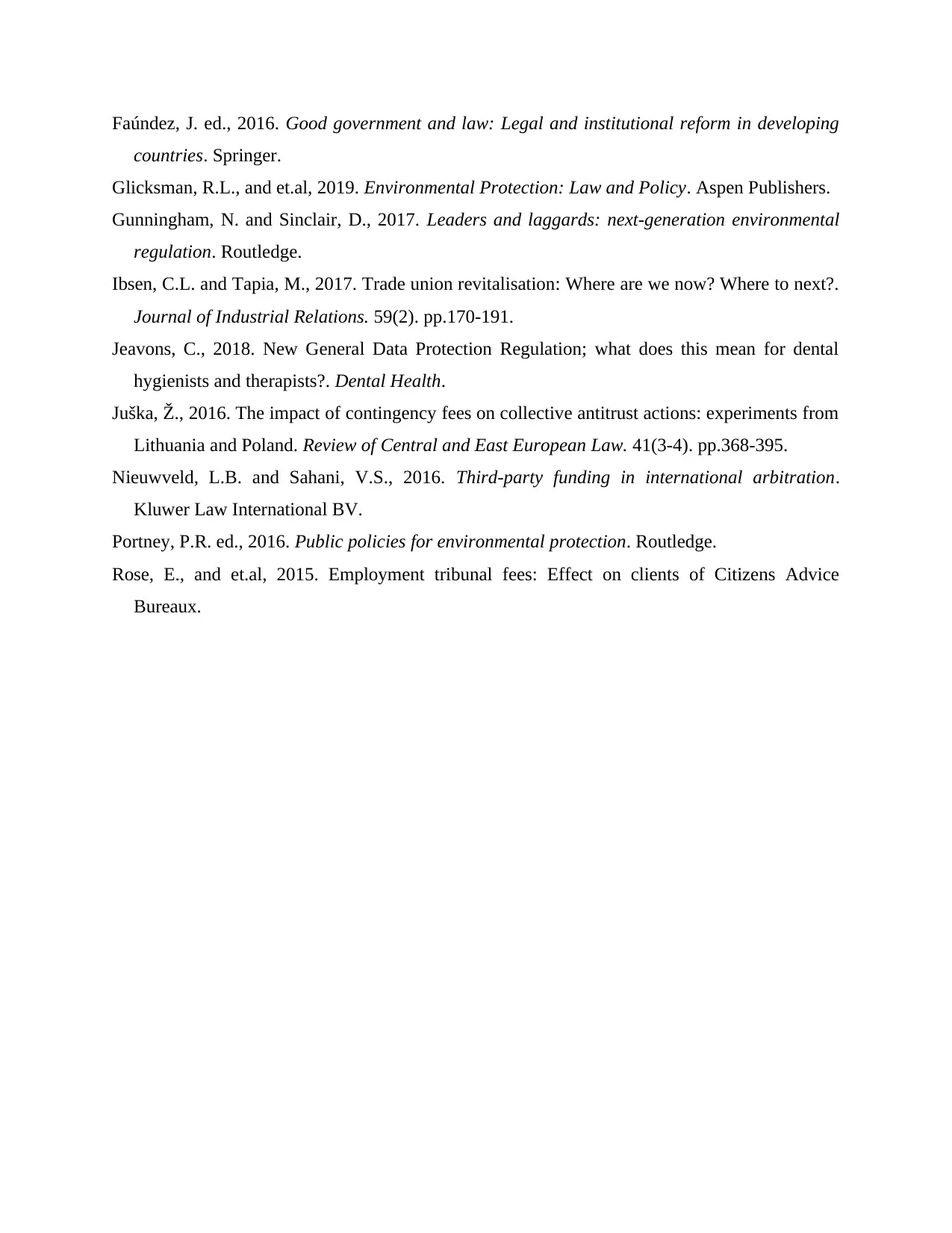
Faúndez, J. ed., 2016. Good government and law: Legal and institutional reform in developing
countries. Springer.
Glicksman, R.L., and et.al, 2019. Environmental Protection: Law and Policy. Aspen Publishers.
Gunningham, N. and Sinclair, D., 2017. Leaders and laggards: next-generation environmental
regulation. Routledge.
Ibsen, C.L. and Tapia, M., 2017. Trade union revitalisation: Where are we now? Where to next?.
Journal of Industrial Relations. 59(2). pp.170-191.
Jeavons, C., 2018. New General Data Protection Regulation; what does this mean for dental
hygienists and therapists?. Dental Health.
Juška, Ž., 2016. The impact of contingency fees on collective antitrust actions: experiments from
Lithuania and Poland. Review of Central and East European Law. 41(3-4). pp.368-395.
Nieuwveld, L.B. and Sahani, V.S., 2016. Third-party funding in international arbitration.
Kluwer Law International BV.
Portney, P.R. ed., 2016. Public policies for environmental protection. Routledge.
Rose, E., and et.al, 2015. Employment tribunal fees: Effect on clients of Citizens Advice
Bureaux.
countries. Springer.
Glicksman, R.L., and et.al, 2019. Environmental Protection: Law and Policy. Aspen Publishers.
Gunningham, N. and Sinclair, D., 2017. Leaders and laggards: next-generation environmental
regulation. Routledge.
Ibsen, C.L. and Tapia, M., 2017. Trade union revitalisation: Where are we now? Where to next?.
Journal of Industrial Relations. 59(2). pp.170-191.
Jeavons, C., 2018. New General Data Protection Regulation; what does this mean for dental
hygienists and therapists?. Dental Health.
Juška, Ž., 2016. The impact of contingency fees on collective antitrust actions: experiments from
Lithuania and Poland. Review of Central and East European Law. 41(3-4). pp.368-395.
Nieuwveld, L.B. and Sahani, V.S., 2016. Third-party funding in international arbitration.
Kluwer Law International BV.
Portney, P.R. ed., 2016. Public policies for environmental protection. Routledge.
Rose, E., and et.al, 2015. Employment tribunal fees: Effect on clients of Citizens Advice
Bureaux.
⊘ This is a preview!⊘
Do you want full access?
Subscribe today to unlock all pages.

Trusted by 1+ million students worldwide
1 out of 9
Related Documents
Your All-in-One AI-Powered Toolkit for Academic Success.
+13062052269
info@desklib.com
Available 24*7 on WhatsApp / Email
![[object Object]](/_next/static/media/star-bottom.7253800d.svg)
Unlock your academic potential
Copyright © 2020–2025 A2Z Services. All Rights Reserved. Developed and managed by ZUCOL.




